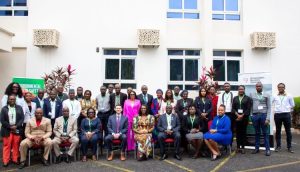Stakeholders and science journalists in West Africa have converged on Abuja, Nigeria, to exchange ideas and deliberate on the challenges and opportunities of genetic bio-control technologies.

The event, organised by African Genetic Biocontrol Consortium, provides a platform for interaction among African experts and institutions to enhance opportunities for technical capacity strengthening, knowledge exchange and deliberation of genetic bio-control technologies.
In her opening remarks, the Director-General, National Biosafety Management Agency in Nigeria (NBMA), Dr Agnes Asabgra, said that the mission was to advance understanding of genetic bio-control technologies, which are innovations with immense promise for addressing critical challenges such as vector-borne diseases.
“As we delve into the complexities of gene drives, synthetic biology, and other emerging biotechnologies, we recognise the need for informed decision-making and robust oversight,” she said.
She said that the aim of the three-day workshop is to strike a balance between harnessing the benefits of these technologies and safeguarding the Africa ecosystems.
“As we embark on this journey, let us remain committed to transparency, collaboration, and evidence-based decision-making,” she stated, explaining that, “together we can shape a future where genetic bio-control contributes to a healthier, more resilient Africa.”
Project Manager, Population Health Sciences, the Foundation for the National Institutes of Health, Washington, DC, Mr. Alex Sullivan, reiterated the organisation’s efforts at supporting scientists and journalists across the Africa continent.
He promised that the organisation would continue to support Africa in training and capacity building for scientists, regulators, communicators, and more, through efforts such as this workshop.
“I and my colleagues at GeneConvene are pleased to support this group of experts convened here to help continue building bridges between scientists and journalists in West Africa and the rest of the continent,” he said.
Stressing that the workshop plays a crucial role in helping experts and journalists to strengthen capacity building, Mr. Sullivan said that his organisation would continue to support efforts in this regard.
“I look forward to an exciting and productive workshop, and on behalf of GeneConvene, we look forward to continuing to support you all as we move forward with these efforts.
“I’m here on behalf of the Foundation for the National Institutes of Health, an organisation based in Washington, DC, and an organisation that is home to the GeneConvene Global Collaborative. for those not yet familiar, GeneConvene is a collaborative entity established more than 20 years ago to support informed decision-making, offer technical information, advice, training, and coordinate research on gene drive and other genetic biocontrol technologies,” he explained.
According to him, these technologies, which can use genetic variants of a target species, like a disease-transmitting mosquito, to control its undesirable impacts, have the potential to greatly improve public health.
Mr. Sullivan said that decisions about these technologies that are effective and ethical require informed stakeholders capable of addressing these questions.
Chief Executive Officer, Kenya Editors Guild, Rosalia Omungo, said that the training would add value and critical knowledge for science reporters to enhance better understanding of science.
She also called for continuous training to promote quality, accurate and ethical reporting.
“We believe the training will add value and critical knowledge for science reporters in order to enhance better understanding on science.
“Continuous training to promote quality accurate and ethical reporting in the subject should be enabled for all journalists. It is my hope that by the end of the three-day gathering we shall “expand Awareness and Understanding of Genetic Biocontrol in Africa,” she said.
According to her, the consultative workshop on communicating the uncertainties associated with emerging biotechnologies could not have come at a better time of renewed deployment of technologies in Africa.
The Consultative Workshop on communicating the uncertainties associated with emerging biotechnologies is hosted by the African Genetic Biocontrol Consortium in collaboration with the NBMA.
The workshop brings together communicators, researchers, policymakers, and industry representatives across West Africa.
The Consortium was officially launched on November 30, 2020, by inaugural not-for-profit member organisations based in Africa.
The member organisations include the Africa One Health Network (AfOHNet), Africa Biological Safety Association (AfBSA), The Multilateral Initiative on Malaria (MIM), Network of African Science Academies (NASAC), Pan-African Mosquito Cont Association (PAMCA) and the GeneConvene Glo Collaborative (GeneConvene).
By Zeniat Abubakar, VON
